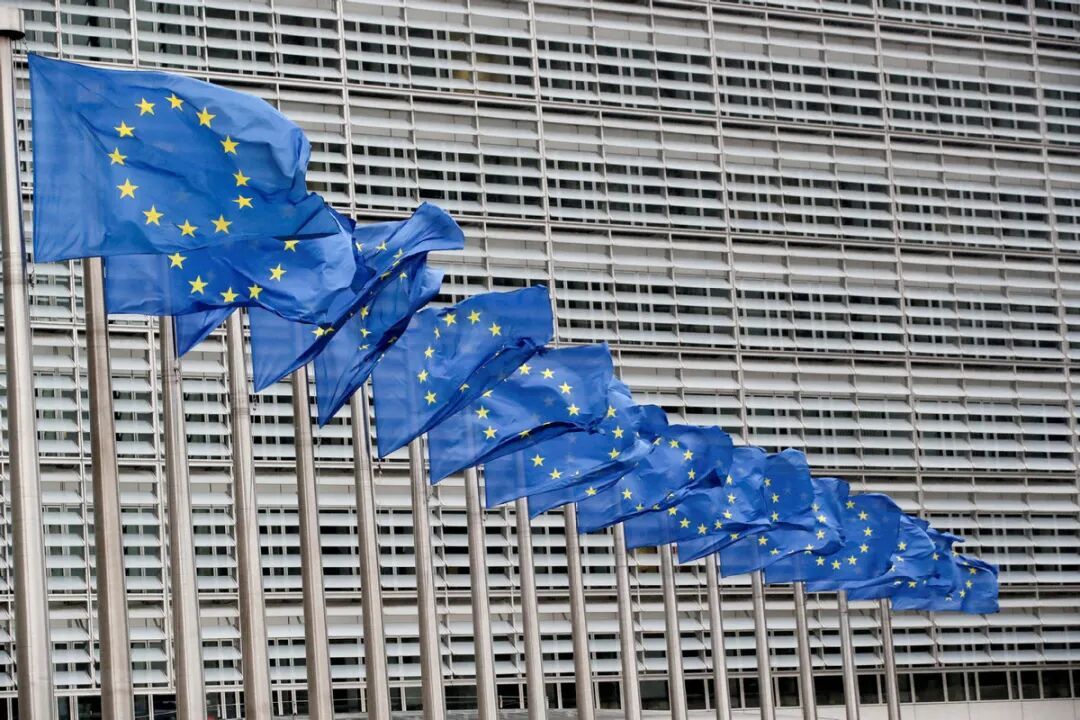点上方“上海社会科学院”关注

This file photo shows European Union flags fluttering outside the EU Commission headquarters in Brussels, Belgium. [Photo/Agencies]
Trade agreement with US could hurt EU, experts say
The details of a July trade framework, recently unveiled by the European Union and the United States, may adversely affect the EU's economy and its industrial growth, experts said, pointing out that it was largely achieved through European concessions.
They suggested that the agreement underscores Europe's fragile autonomy and could hasten its move toward trade diversification, highlighting that its implementation remains uncertain, although the deal provides short-term stability and predictability in transatlantic trade.
According to a joint statement released on Thursday, the US will impose a maximum, all-inclusive tariff of 15 percent on most EU exports, including cars, pharmaceuticals, semiconductors and lumber.
The EU, in return, pledged to remove tariffs on all US industrial goods and expand market access for US seafood and agricultural products.
The terms of the deal have drawn criticism from some European leaders.
German Chancellor Friedrich Merz questioned its implications on Sunday at a government Open Day, asking, "How do we handle world trade if, for example, the Americans are no longer prepared to play by the rules of the World Trade Organization?"
Hungarian Minister of Foreign Affairs and Trade Peter Szijjarto said the trade agreement favors Washington over the EU, and many other EU officials have voiced discontent with its perceived imbalance.
Experts warned that the deal is asymmetrical and may harm the European economy over the long term, while potentially intensifying transatlantic competition.
Jiang Yunfei, an assistant research fellow at the Shanghai Academy of Social Sciences' Institute of World Economy, noted that exports have been a key economic driver for the EU, especially amid years of sluggish economic growth, weak investment and lackluster consumption.
As the US is the EU's largest export market and source of trade surplus, "the US' 15 percent tariff on European goods will reduce EU exports, undermining a major engine of the region's economic growth", Jiang said, adding that early signs of the tariff's impact are visible. In June, EU exports to the US plummeted by around 10 percent year-on-year, and the trade surplus with the US halved to 9.6 billion euros ($11.2 billion) from 18.5 billion euros a year ago.
Jiang said that the EU accepted the deal mainly to mitigate greater losses. "With the US as its largest source of surplus, the EU held limited leverage in negotiations," she said.
Short-term relief
Cui Hongjian, director of Beijing Foreign Studies University's Center for European Union and Regional Development Studies, said the tariffs would increase trade costs for European industries, eroding their competitiveness.
"Moreover, the EU's pledge to boost investment in the US may lead some European manufacturers to relocate production to the US to avoid tariffs," Cui said. "This could intensify competition between the two economies, not just in products, but in investment and industrial capacity, which means the agreement, instead of resolving underlying competition, actually makes it more entrenched and difficult to manage."
He emphasized that the deal offers only short-term relief rather than a sustainable solution for either side.
Cui suggested that Europe's concessions were influenced not just by economics but also significantly by geopolitical factors, particularly concerns about potential US pressure on the EU regarding the Russia-Ukraine conflict.
He also said there are practical challenges. "The EU lacks the legal authority to force private companies to invest in the US. Additionally, unresolved disputes in sectors like agriculture and digital trade could reemerge as flashpoints."
In response to US tariff pressure, some European leaders are advocating diversified trade partnerships. German Chancellor Merz stressed the need to seek new trade partners in the coming years, while European Central Bank President Christine Lagarde called for stronger trade ties with countries other than the US.
Experts said that while the agreement underscores an urgent need for the EU to diversify its trade partnerships, it will be difficult to achieve this within a short period.
"It's undoubtedly challenging for Europe to find new markets at this moment. However, the EU must persist in its diversification strategy. Only by doing so can it gain stronger leverage when dealing with similar US policy shifts in the future," said Cui, from Beijing Foreign Studies University.
By YANG RAN | China Daily Global
姜云飞(上海社会科学院世界经济研究所)
来源:中国日报
制作审核:院党委宣传部
(院科研成果传播办公室)
责任编辑:王立伟

扫码关注
上海社会科学院积极响应中央加强中国特色新型智库建设的号召,以构建国内一流、国际知名的社会主义新智库为目标,大力实施智库建设和学科发展的双轮驱动发展战略,努力成为哲学社会科学创新的重要基地,成为马克思主义中国化的坚强阵地,成为国内外学术交流的主要平台,成为具有国内外重要影响力的国家高端智库。